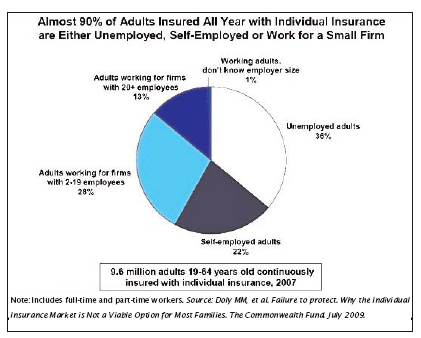Clarity on exactly what shape healthcare reform will take in this country might still be more than a bit unsettled, but a new report is making it abundantly clear that the health insurance market isn't a viable option for the majority of uninsured adults.
The report titled Failure to Protect: Why the Individual Insurance Market Is Not a Viable Option for Most U.S. Families is from the Commonwealth Fund (New York) and shows that nearly 75% of people who tried to buy insurance on their own in the last three years did not purchase a policy, primarily because premiums were too high.
In addition the report shows that, among adults with individual coverage or who tried to buy coverage in the past three years, 57% said it was very difficult or impossible to find coverage they could afford, 47% said it was very difficult or impossible to find a plan with the coverage they needed, and 36% were denied coverage or charged more because of a pre-existing condition, or had the condition excluded from their coverage.
The large majority of Americans who have individual coverage are unemployed, self-employed, or employed by firms with fewer than 20 workers – one-third (36%) are unemployed, and another 50% are self-employed or employed by firms with fewer than 20 workers. People with individual insurance also tend to be older, with the majority between the ages of 50 and 64, according to the report. Families with low and moderate incomes have the hardest time affording insurance on the individual market: 85% of those at or below 200% of the federal poverty level (about $44,000 for a family of four) who sought an individual health insurance plan did not end up purchasing one and of that group, 67% cited cost as the reason they didn't purchase a plan.
"We found that many people had no options and were unable to afford the high costs of COBRA, (Consolidated Omnibus Budget Reconciliation Act)," Michelle Doty, a researcher surveyor with CF told Medical Device Daily. "We also found that employers were finding it more and more difficult to pay for the higher premiums."
Additional findings show that adults with health problems report the highest rates of problems finding a health plan through the individual market: 60% of those found it very difficult or impossible to find a plan with the coverage they needed; 70% found it very difficult or impossible to find an affordable plan, and nearly half were turned down or charged a higher premium because of a pre-existing condition. Nearly 80% never purchased a plan.
Adults with individual insurance are increasingly underinsured: 30% were underinsured in 2007, up from 17% in 2003.
People with individual insurance are seeing higher deductibles: 39% of people with individual insurance had policies with deductibles of $1,000 or more in 2007, up from 29% in 2003. There was also an increase in the share of people with high deductibles in employer plans: 11% of those with employer insurance had deductibles of $1,000 or more in 2007, up from 5% in 2003.
The authors of the study say that a declining economy along with stagnant wages, and rising healthcare costs over the past ten years are strong forces behind why so many end up without a plan. The authors point out that the mounting job losses in the recession and continued unabated growth in healthcare costs underscore the need for policymakers to form consensus around strategies that provide affordable and comprehensive coverage for all, as well as health system reforms that can lower costs and improve quality.
"What we're also finding is that people are essentially paying more for less and some are turning to emergency rooms for their standard of care," she told MDD. "You don't want Chronic Care management to begin to be handled in the ER. That just bogs down the system."
So what do these findings mean in the context of current attempts at healthcare reform?
The answer according to the CF is the creation of a National Health Insurance Exchange. It would be one that would call for carriers to be prevented from charging higher premiums for poor health status; create a premium subsidy to help people afford plans; and also create a minimum standard benefit established so a person would know what they were getting before selecting a plan option.
Doty said she hopes that the study articulates the urgency and overwhelming need for healthcare reform.
"I think that it shows healthcare reform is important and it needs to be done now," Doty said. "We can't afford the status quo."


